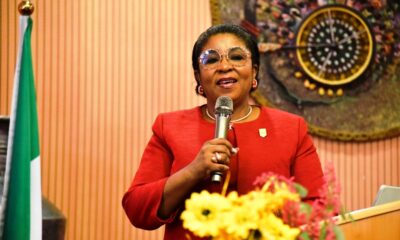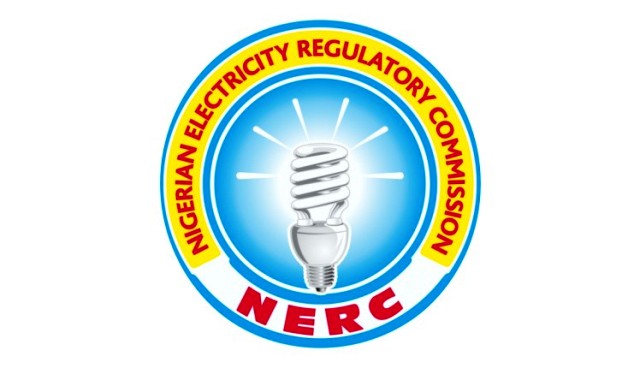Editorial
Adieu, Alex Akwueme (1932 – 2017)
Nigeria, Africa’s most populous country was practically thrown into mourning on November 19, 2017 following the eventual demise of the nation’s first Executive Vice President, Dr Alex Ekwueme, in a London hospital, after a brief illness.
Born on October 21, 1932 to the Ekwueme family of Oko in Orumba North Local Government Area of Anambra State, young Alex started his early education at St. John’s Anglican Central School, Ekwulobia in Anambra State. He later proceeded to Kings’ College, Lagos for his secondary education before travelling as a Fulbright scholar to obtain a bachelor’s degree in Architecture and M.Sc. Urban Planning at the University of Washington, Seattle in the United States of America.
He also obtained degrees in Sociology, History, Philosophy and Constitutional Law from London University, while his Ph.D in Architecture came from the University of Strathclyde, United Kingdom. Ekwueme later enrolled for his Barrister-at-Law examination at the Nigerian Law School in 1991, years after serving as Nigeria’s vice president.
On completion of his architecture degrees in the US, Ekwueme worked briefly as an assistant architect with Leo A. Daly & Associates and later in London with Nickson and Partners. Back in Nigeria, he worked as Head of Construction and Maintenance Department at Esso West Africa Limited. It was after these stints that he established Ekwueme & Associates, the first indigenous architectural and urban planning firm in Nigeria.
As a doyen of architecture in Nigeria, Ekwueme was variously elected to serve as president and chairman, Board of Trustees, Nigerian Institute of Architects (NIA) and also the Architects Registration Council of Nigeria (ARCON).
During the Nigerian Civil War, he was said to have headed the Biafran Airports Board which undertook the ingenious construction of Uli and Uga Airstrips through which foreign humanitarian shipments and war materials entered the rebel enclave.
Ekwueme’s initial foray into Nigeria’s murky political waters was in 1978 when he contested the governorship primaries of the defunct National Party of Nigeria (NPN) in the old Anambra State but lost to Chief Christian Onoh. Apparently undaunted by this loss, Ekwueme had opted to reach for the higher office of the vice president and eventually paired with Alhaji Shehu Shagari to win the 1979 presidential election before being toppled in a military putsch four years later.
After some years of house arrest and outright ban from politics, alongside other Second Republic politicians, Ekwueme bounced back to public reckoning with his appointment into the National Constitutional Conference of 1995 where he made a sterling proposal for the creation of six geo-political zones in Nigeria so as to enable people from minority regions aspire to occupy the highest offices in the land rather than what was obtainable then, where only people from a region dominated the political scene.
Ekwueme’s influence also went beyond Nigeria. Apart from being a member of the Economic Community of West Africa (ECOWAS) Council of Elders, he had in 2000 also led monitoring teams to the parliamentary and presidential elections in Zambia and Tanzania, respectively. He also co-led an observer team to the 2005 presidential run-off election in Liberia.
Ekwueme’s role in galvanizing members of the G34 political movement which later metamorphosed into the Peoples Democratic Party (PDP) in 1998 cannot be over-emphasised. Even as an octogenarian, Ekwueme still accepted to undertake the onerous task of pacifying and pulling some aggrieved members of his party back especially following the party’s dismal outing in the 2015 polls.
As Nigerians and even foreign sympathisers gather to bid him a final farewell in his Oko country home today, there is no doubt that they will miss a man who truly would have loved to bequeath to the next generation a better nation than the one he left behind. Nigeria will surely miss the Ekwueme rallying factor in its politics. But more than anyone else, the Ekwueme family and Oko kingdom will greatly miss their beloved Ide Aguata who attracted so much development to the community while alive and even in death.
Ekwueme was indeed a man of peace, high integrity and served as a natural stabilising voice in times of national crises. In fact, if his late friend and brother, Dim Chukwuemeka Odimegwu-Ojukwu, had survived him, the ex-Biafran warlord would most probably have paid a glowing tribute to another ‘best president Nigeria never had’.
Adieu, Dr Alexander Ifeanyichukwu Ekwueme, GCON.
Editorial
Making Rivers’ Seaports Work

When Rivers State Governor, Sir Siminalayi Fubara, received the Board and Management of the Nigerian Ports Authority (NPA), led by its Chairman, Senator Adeyeye Adedayo Clement, his message was unmistakable: Rivers’ seaports remain underutilised, and Nigeria is poorer for it. The governor’s lament was a sad reminder of how neglect and centralisation continue to choke the nation’s economic arteries.
The governor, in his remarks at Government House, Port Harcourt, expressed concern that the twin seaports — the NPA in Port Harcourt and the Onne Seaport — have not been operating at their full potential. He underscored that seaports are vital engines of national development, pointing out that no prosperous nation thrives without efficient ports and airports. His position aligns with global realities that maritime trade remains the backbone of industrial expansion and international commerce.
Indeed, the case of Rivers State is peculiar. It hosts two major ports strategically located along the Bonny River axis, yet cargo throughput has remained dismally low compared to Lagos. According to NPA’s 2023 statistics, Lagos ports (Apapa and Tin Can Island) handled over 75 per cent of Nigeria’s container traffic, while Onne managed less than 10 per cent. Such a lopsided distribution is neither efficient nor sustainable.
Governor Fubara rightly observed that the full capacity operation of Onne Port would be transformative. The area’s vast land mass and industrial potential make it ideal for ancillary businesses — warehousing, logistics, ship repair, and manufacturing. A revitalised Onne would attract investors, create jobs, and stimulate economic growth, not only in Rivers State but across the Niger Delta.
The multiplier effect cannot be overstated. The port’s expansion would boost clearing and forwarding services, strengthen local transport networks, and revitalise the moribund manufacturing sector. It would also expand opportunities for youth employment — a pressing concern in a state where unemployment reportedly hovers around 32 per cent, according to the National Bureau of Statistics (NBS).
Yet, the challenge lies not in capacity but in policy. For years, Nigeria’s maritime economy has been suffocated by excessive centralisation. Successive governments have prioritised Lagos at the expense of other viable ports, creating a traffic nightmare and logistical bottlenecks that cost importers and exporters billions annually. The governor’s call, therefore, is a plea for fairness and pragmatism.
Making Lagos the exclusive maritime gateway is counter productive. Congestion at Tin Can Island and Apapa has become legendary — ships often wait weeks to berth, while truck queues stretch for kilometres. The result is avoidable demurrage, product delays, and business frustration. A more decentralised port system would spread economic opportunities and reduce the burden on Lagos’ overstretched infrastructure.
Importers continue to face severe difficulties clearing goods in Lagos, with bureaucratic delays and poor road networks compounding their woes. The World Bank’s Doing Business Report estimates that Nigerian ports experience average clearance times of 20 days — compared to just 5 days in neighbouring Ghana. Such inefficiency undermines competitiveness and discourages foreign investment.
Worse still, goods transported from Lagos to other regions are often lost to accidents or criminal attacks along the nation’s perilous highways. Reports from the Federal Road Safety Corps indicate that over 5,000 road crashes involving heavy-duty trucks occurred in 2023, many en route from Lagos. By contrast, activating seaports in Rivers, Warri, and Calabar would shorten cargo routes and save lives.
The economic rationale is clear: making all seaports operational will create jobs, enhance trade efficiency, and boost national revenue. It will also help diversify economic activity away from the overburdened South West, spreading prosperity more evenly across the federation.
Decentralisation is both an economic strategy and an act of national renewal. When Onne, Warri, and Calabar ports operate optimally, hinterland states benefit through increased trade and infrastructure development. The federal purse, too, gains through taxes, duties, and improved productivity.
Tin Can Island, already bursting at the seams, exemplifies the perils of over-centralisation. Ships face berthing delays, containers stack up, and port users lose valuable hours navigating chaos. The result is higher operational costs and lower competitiveness. Allowing states like Rivers to fully harness their maritime assets would reverse this trend.
Compelling all importers to use Lagos ports is an anachronistic policy that stifles innovation and local enterprise. Nigeria cannot achieve its industrial ambitions by chaining its logistics system to one congested city. The path to prosperity lies in empowering every state to develop and utilise its natural advantages — and for Rivers, that means functional seaports.
Fubara’s call should not go unheeded. The Federal Government must embrace decentralisation as a strategic necessity for national growth. Making Rivers’ seaports work is not just about reviving dormant infrastructure; it is about unlocking the full maritime potential of a nation yearning for balance, productivity, and shared prosperity.
Editorial
Addressing The State Of Roads In PH

Editorial
Charge Before New Rivers Council Helmsmen

-
Nation5 days ago
Rivers Chief Judge Pardon 14 Inmates From Prison To End 2024/2025 Legal Year
-
Nation5 days ago
Cancer Care: Expert Seeks Hospice In UPTH
-

 News5 days ago
News5 days agoUse Service Year To Build Capacity, Fubara Urges Corp Members
-

 Featured5 days ago
Featured5 days agoWorkers’ Audits Not Meant For Downsizing – Walson Jack
-
Nation5 days ago
Union Petitions EFCC, ICPC Over Tax Fraud Allegations Against Daewoo, Saipem
-

 Politics5 days ago
Politics5 days agoSenate Confirms Amupitan As INEC Chairman
-

 Nation5 days ago
Nation5 days agoHYPREP Remains Steadfast In Adhering To International Standards—Zabbey …As Regulators, Asset Owners Hail Project
-

 News5 days ago
News5 days agoNERC Approves N28bn For Procurement Of Meters For Band A Customers

